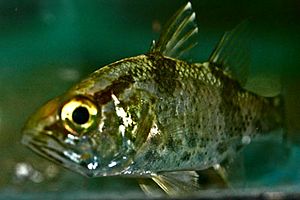Glossamia aprion facts for kids
Quick facts for kids Glossamia aprion |
|
|---|---|
 |
|
| Scientific classification |
|
| Kingdom: | Animalia |
| Phylum: | Chordata |
| Class: | Actinopterygii |
| Order: | Kurtiformes |
| Family: | Apogonidae |
| Genus: | Glossamia |
| Species: |
G. aprion
|
| Binomial name | |
| Glossamia aprion (J. Richardson, 1842)
|
|
| Script error: The function "autoWithCaption" does not exist. | |
| Synonyms | |
|
Apogon aprion J. Richardson, 1842 |
|
Script error: No such module "Check for conflicting parameters".
The mouth almighty (scientific name: Glossamia aprion) is a type of freshwater fish. It belongs to a group of fish called cardinalfishes. You can find this fish in fresh waters across northern Australia and New Guinea. It is a ray-finned fish, which means its fins are supported by bony rays.
Contents
What Does the Mouth Almighty Look Like?
The mouth almighty has a creamy-brown body. It has six to eight broken, dark olive-brown markings. These markings look like stripes and reach down to its belly.
This fish also has many dark brown spots and blotches. These spots are different sizes and shapes. A dark line runs from its eye to its gills.
Its first dorsal fin (the fin on its back) is dark, especially the outer half. The pelvic fins (on its underside) and the inner parts of its second dorsal and anal fins (near its tail) are also dark. These fins often have dark spots and swirly patterns.
The mouth almighty can grow up to about 18 centimeters (7 inches) long. However, most of them are usually around 12 centimeters (4.7 inches) long.
Where Does the Mouth Almighty Live?
The mouth almighty is found in many places across northern Australia. It lives in rivers, creeks, and lagoons. You can find it from the Fitzroy River in Western Australia all the way to the Burnett River in Queensland. It also lives in similar watery places in New Guinea.
Habitat and Habits
The mouth almighty likes to live in fresh water that is still or flows very slowly. It often hides among water plants in shallow areas near the edges of the water.
This fish is a nocturnal animal, meaning it is active at night. It hunts for its food by ambushing its prey. Its diet mainly includes small crustaceans (like tiny shrimp), insects, and smaller fish.
Reproduction and Life Cycle
When it's time to lay eggs, the female mouth almighty lays a small number of large eggs. The male fish then takes care of these eggs in a special way. He holds them in his mouth until they hatch! This is why it's called a mouthbrooder. The baby fish hatch when they are already quite developed.

